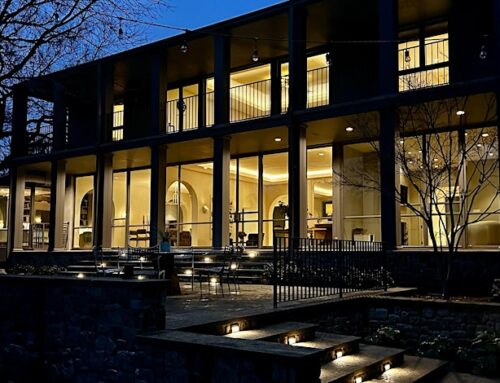
The music cues, and a stream of cloaked teenagers in tasseled caps march forward. After 13 years of elementary, middle and high school, it’s all come to this: graduation day.
Along that journey, some have become stars in the stadium, some have basked in the limelight, and some have advanced to the head of the class.
But others have excelled in a completely different way. They’ve overcome trials and hardships, often beating odds that others wouldn’t have conquered.
These are the stories of neighborhood graduates who, in the dawn of life, have outshined some of life’s darkest moments.
ROSS DYER is polite and soft-spoken. But don’t color him timid. This seemingly shy W.T. White senior is comfortable in the limelight, preferably center stage in a musical or cheering sideline for the Longhorns.
It wasn’t always that way, however. Just ask White choir director Mike Parker.
“He’s really come of out his shell,” Parker says. “He actually got his start doing the lighting for choir, but when he finally did come out to audition, he made varsity choir. He’s gone from behind-the-scenes to in the scene.”
Dyer’s newfound front-and-center role, in fact, earned him the “Most Spirited” honor in his class. That’s an especially noteworthy distinction when you consider he hasn’t had the cheeriest of times.
Dyer was adopted as a baby, but after his adopted parents divorced while he was in middle school, he says he was left to be man of the house.
“My younger brother really started acting out. He was running away a lot and getting into trouble. Things got pretty bad at the house, so I had to step up and help my mom,” he says. “It was a really tough situation that caused a lot of pain for our family. Maybe it sounds strange, but I think if I hadn’t been adopted, my mom would have faced a lot more on her own. I feel like, in a way, I was supposed to be in her life for this reason.”
Today, Dyer’s younger brother lives in another city. Dyer says life is more peaceful for him and his mother, but not necessarily easier.
“We’ve had a lot of financial problems lately, and at times, my mom’s had to work two jobs to keep us afloat. I see how hard she works, and it makes me want to do something with my life so I can give back to her.”
For that reason, Dyer says he plans to attend the University of North Texas to study theater and electrical engineering, so he ultimately can have a career in theater production.
While life certainly hasn’t been easy, Parker says this has never been an excuse for Dyer to not excel.
“There were times he’d ride his bike to school because he didn’t have a way to get here. He’s facing a lot of the same problems as other kids at this school, but he realizes he can overcome them if he does what he’s supposed to do, and stays on the right track.
“There is something in him that forces him to overcome, and we can learn something from that.”
RAYMOND GOMEZ is the kind of guy you’d want as a friend if you had a large couch that needed to be moved into a third-story apartment. With broad shoulders and thick limbs, he’s the picture of brute strength.
But this jock will be the first to tell you he’s “always been a momma’s boy.”
When Gomez speaks of his mother, there’s warmth in his voice — but a flicker of pain in his eyes. After her death a year ago, he’s still coping with the untimely loss.
“I still miss her so much,” he says. “I sometimes wish I could just call her to hear her voice or hug her one more time.”
Gomez says his mother suffered from chronic illnesses, which he believes led her into a deep depression.
“She had very bad headaches, and she would get really depressed,” he says.
So when she decided to take some time for herself with a vacation to Las Vegas last year, he actually thought it might do her some good. Gomez says he wished her well, and hugged for what would be the very last time.
“After she got there, she stopped answering her cell phone, and we knew something was wrong.”
Gomez’s mother had passed away in her Las Vegas hotel room. How exactly she died, Gomez isn’t certain.
“I think my dad knows how my mom died, but he has not told me or my younger siblings. That has made it a little harder to get closure, but I just try and focus on the good times we had together. That’s helped me get through it.”
Football proved to be a healthy outlet for Gomez until he suffered a serious injury.
“It was the first game of the season, and I tore my ACL and MCL — plus it was a game against our biggest rival, Hillcrest, to top it all off.
“I had to have surgery, and that was the end of football for me. That was tough. My mom had died, and now this injury happened, and I couldn’t have football as an outlet. I had a lot of anger. I guess you could say that was a dark period for me.”
Gomez says that “dark period” was especially hard because his injuries have put his dreams of becoming a Marine in jeopardy.
“I want to become a Marine and serve in Fire Crash and Rescue because I want to help people,” he says. “But if I don’t totally heal from my football injury, they may not accept me into service.”
For that reason, Gomez says he’s stuck with his physical therapy, allowing his body to heal. He also says aside from healing physically, he’s also focused on healing spiritually.
“Choir has also been a big outlet for me emotionally. I’ve always been a singer — I used to sing to my mom all the time. She always loved to hear me sing. She took pride in me.”
And when the entire White choir came to his mother’s funeral, it made a very painful day a little less painful.
“It helped because it really let me know I had people around me who cared about what I was going through. I was really touched that day.”
Gomez says the White community has supported him through what has proved to be a tough year — in particular, he points to class representative Cathy Hodge as a huge support.
“She saw me struggling when I was at that low point and she really reached out to me. Now we’re so close, she’s like a mother to me.”
Hodge says the feeling is mutual.
“That’s my son as far as I’m concerned. He’s the kind of kid I still want knocking on my door when I’m 60 or 70.
“After he hurt himself, that just about did him in. He had just lost his mother, and now he could not play the sport he loved. That was the icing on the cake. But he pulled through it, and he did it with grace. I don’t know that I could even do that.
“I know it may sound cliché, but we adults learn so much from these kids. You think you’ve had a bad day, and then you hear what some of these kids are going through, and you realize you’ve got nothing to complain about.
“He’s a true inspiration.”
OSCAR CASAS
“Let me tell you something about Oscar: He is always there with a ‘yes, ma’am’ smile on his face. This boy is just a ray of sunshine.”
That’s Hillcrest senior Oscar Casas in a nutshell, according to campus initiative administrator Anne McNutt.
Casas bashfully gushes as he listens to McNutt talk about him, and he offers a humble response.
“I really owe it to all my parents; they’re the ones who set the bar for me,” he says.
“They’ve sacrificed so much for me, there aren’t even words to thank them. The only ‘thank you’ I can give them is to make them proud. They always wanted me to do better for myself than they did. It’s always been their dream for me to go to college.”
Maybe that explains his drive to excel. He’s been on the lacrosse, baseball, swim and dive teams; he’s the school mascot; and with a solid GPA, he’s set to be the first in his family to attend college.
“But you know what’s really remarkable about Oscar?” McNutt says. “He could have easily taken a lot of low roads, but he chose not to.”
Casas, who transferred to Hillcrest from another part of the city, says he has seen some tough things in his neighborhood.
“Crime is a real problem where I live. There are gangs and drug houses — I’ve heard gunshots nearby, and there have been a couple of police chases down my street.
“When I was in junior high, I started going down that wrong path. I was a troublemaker, and let’s just say I didn’t show my good side. I failed all my TAKS tests, and that put me in jeopardy of not going to high school.
“Seeing how ashamed that made my parents really upset me and motivated me to change the direction I was going.”
Casas attributes that change, in part, to his involvement with the Dallas Police Explorer program.
“In this program, I’m basically like a mini-cop,” he says. “I learn everything they learn in the police academy, and I do community service in my neighborhood. It’s really helped keep me on the right road.
“My life has been a rough road, and I’ve had some speed bumps along the way — but I’ve made it this far, and I’m not going to let anything get in my way.”






